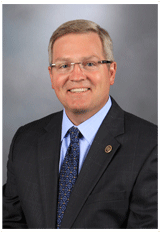As a legislator, there are many ways to support higher education. One is to provide adequate funding to our public institutions; another is to support scholarships to those seeking higher education; and, finally, we can work with surrounding states to share best practices and help contain costs. One way to achieve that is by being a part of a 12-member state compact called Midwestern Higher Education Compact (MHEC).
MHEC is a regional organization that works with member states to advance many goals, among which are to coordinate, run and improve a vast array of programs to expand postsecondary opportunities and potential successes for those who seek knowledge, skills and training. The 12 states that make up the compact are Illinois, Indiana, Iowa, Kansas, Michigan, Minnesota, Missouri, Nebraska, North Dakota, Ohio, South Dakota, and Wisconsin.
After several years serving as one of Missouri’s executive members of the 60-member governing body for MHEC, I was recently elected vice-chair of the commission in Milwaukee during our semi-annual meeting. First appointed as a commissioner from Missouri in 2003, I served in that capacity for a number of years before I was honored to serve as the compact treasurer during the 2013-14 session. The other four commissioners serving from Missouri include Ken Dobbins, president of Southeast Missouri State University; John McGuire, leadership coach representing community colleges; Mark Smith, Associate Vice Chancellor of Washington University; and Mike Thomson, chair of the Missouri House of Representatives Higher Education Committee.
During this meeting, I had the opportunity to approve Missouri as the fifth state to join the Midwestern State Authorization Reciprocity Agreement, or M-SARA. The goal of this agreement is streamlining online college courses, while expanding educational opportunities through interstate collaboration. During the 2014 legislative session, I sponsored Senate Bill 699, allowing the Coordinating Board for Higher Education to enter in to this type of agreement in order to improve the state of higher education in Missouri. Nationally, SARA is an overall effort to make distance education courses easier to access, especially across state lines, as well as make it less difficult for states to regulate higher education and the institutions that teach at that level.
Education is not only a privilege in today’s society. It is also the responsibility of our state’s citizens. When my fellow committee members and I presented the final report of the Educated Citizenry 2020 committee, one of our goals was for 60 percent of all adults in the state to hold postsecondary degrees or credentials by the year 2020. M-SARA is one more way to ensure this goal comes to pass.
I look forward to continuing my work with MHEC, collaborating with the commission and our own Coordinating Board of Higher Education to advance postsecondary education in Missouri. Improving education means a better advantage in the world market as we move forward into a brighter future.
As always, please feel free to contact me or my staff with any questions or concerns at any time. We look forward to hearing your comments and suggestions and trying to answer any questions you may have. You can reach us by phone at 866-277-0882 (toll-free) or 573-751-2272, or by fax at 573-526-7381. |



